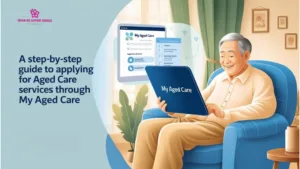Juggling the responsibility of caring for a loved one can be incredibly rewarding, but it can also be emotionally and physically draining. There will be times when you simply need a break, a chance to recharge and come back feeling refreshed. That’s where respite care steps in – a lifesaver for both caregivers and the individuals they care for.
Whether you’re new to caregiving or looking for ways to balance your responsibilities, this guide will walk you through everything you need to know about respite care, providing insights that can make a world of difference in your caregiving journey.
What is Respite Care?
Respite care is a specialised support service designed to provide temporary relief for primary caregivers. Whether you’re caring for an elderly parent, a family member with a disability, or someone with a chronic illness, respite care allows you to take a well-deserved break while ensuring your loved one receives high-quality care in your absence.
In other words, respite care is a short-term solution that allows primary caregivers to rest, recharge, and take care of their personal needs. This break can be for a few hours, a day, or even several weeks, depending on your needs and the type of respite care chosen.
There are various misconceptions about respite care. It’s not a sign of weakness or inadequacy. It’s a proactive approach to ensure the long-term well-being of both the caregiver and the individual receiving care.
Types of Respite Care
Types of NDIS Respite Care isn’t a one-size-fits-all solution. Instead, it’s a flexible, dynamic support system designed to meet the diverse needs of caregivers and care recipients.

1. Emergency Respite Care
Life is unpredictable, and sometimes, caregivers face emergencies that temporarily prevent them from fulfilling their duties. Emergency respite care steps in during these critical moments, providing immediate assistance. Situations where emergency respite care may be needed include:
- The sudden illness or hospitalisation of a primary caregiver.
- The unexpected death of a caregiver.
- Urgent personal or family crises requiring the caregiver’s attention.
2. In-Home Respite Care
For those who prefer to remain in a familiar environment, in-home respite care brings professional support directly to your door. A qualified caregiver assists with daily tasks such as bathing, dressing, meal preparation, and medication management. This option allows caregivers to step away while ensuring their loved one’s comfort and safety in their own home.
3. Centre-Based Respite Care
Centre-based respite care offers a stimulating environment for your loved one while providing caregivers a break during the day. These centres, often located in community hubs or clubs, provide supervised activities, social interaction, and meals. Programs typically run for several hours, allowing caregivers time to work, run errands, or relax.
4. Short-Term Residential Respite Care
If caregivers need an extended break, short-term residential respite care provides comprehensive support in a dedicated facility. Loved ones can stay for a few days to several weeks, receiving 24-hour care, meals, and recreational activities. This option is particularly useful during caregiver holidays or recovery periods after an illness or surgery.
5. Cottage Respite
Cottage respite is a unique, community-based option where care is provided overnight or over a weekend in a home-like setting. It’s ideal for individuals who need minimal assistance but benefit from companionship and a change of scenery. Cottage respite is offered under the Commonwealth Home Support Programme and typically lasts two to three days. This setup fosters a relaxing atmosphere while ensuring professional care.
6. Residential Respite Care
For individuals who require extensive support, residential respite care in an aged care home offers a higher level of service. This option is designed for people who need assistance with most daily tasks and is available for durations ranging from a few days to several weeks.
Eligibility and Access:
- An Aged Care Assessment Team (ACAT) evaluation is typically required to access residential respite care.
- In emergencies, providers can arrange an urgent assessment to facilitate immediate support.
7. Informal Respite Care
Informal respite care involves enlisting the help of friends, family, or neighbours to step in temporarily. While this can be a cost-effective option, it’s essential to ensure the person providing care is capable and comfortable with the responsibility. Informal care is best suited for short-term, low intensity needs and can be a practical addition to formal respite arrangements.
Why It’s Important to Explore Respite Care Options
Importance of NDIS Respite Care in Every caregiving journey is unique, and finding the right type of respite care is crucial to maintaining balance. Whether it’s an emergency situation or planned support, the variety of options ensures there’s a solution for everyone. Programs like the Commonwealth Home Support Programme and resources such as the Carer Gateway make it easier to access these services and provide a better quality of life for both caregivers and their loved ones.
Benefits of Respite Care for Caregivers
Now, let’s talk about the incredible benefits respite care can offer to caregivers:
Reduced stress and burnout
Taking a break allows you to recharge, manage your own well-being, and ultimately return to your caregiving role feeling more positive and energised.
Improved physical and mental health
Respite care provides time for much-needed self-care, reducing the risk of physical and mental health issues that can accompany chronic stress.
Strengthened relationships
A refreshed caregiver fosters a more positive and supportive relationship with the individual they’re caring for.
Enhanced coping skills
Respite care can be a valuable learning experience. Observing how professionals handle certain aspects of care can equip you with new skills and techniques.
Benefits of Respite Care for Care Recipients
Your loved one can experience a welcome change of scenery and routine, leading to:
Socialisation and stimulation
Centre-based respite care offers opportunities to interact with peers, participate in activities, and combat feelings of isolation.
Professional care
Qualified professionals ensure their needs are met with expertise and compassion.
Reduced caregiver strain
When the primary caregiver is refreshed and recharged, the recipient receives more focused and patient care.
How much does respite care cost?

NDIS Respite Care Cost in Australia vary depending on your specific circumstances and the type of care you receive. The My Aged Care system uses a means-tested approach to determine fees. If you’re receiving in-home or residential respite care, you may be asked to contribute to the cost based on your income and assets.
For home care respite, the fees are typically calculated daily and can range from minimal to substantial, depending on your financial situation. In residential respite care, fees are structured differently – you might pay a basic daily fee (currently around 85% of the single basic aged pension), and potentially an additional means-tested care fee.
Importantly, people with limited financial resources may be eligible for reduced or waived fees.
The exact cost can be determined through a comprehensive assessment by My Aged Care, which takes into account your financial circumstances, the level of care required, and available government subsidies. Veterans, individuals with disabilities, and those with specific care needs may also be eligible for additional financial support or fully subsidised government respite care services.
Who Provides Respite Care Services?
Respite care services in Australia are delivered through a network of carefully regulated and government-subsidised organisations, such as:
- Aged Care Support Providers
- National Disability Insurance Scheme Registered Providers
- Commonwealth Home Support Programme Organisations
- State and Territory Disability Support Services
These service providers play a crucial role in ensuring accessible, high-quality care for individuals and their caregivers across various communities.
Your NDIS Registered Provider, Dream Big Support Services, is your trusted partner in providing exceptional respite care Queensland has to offer. We understand the challenges caregivers face and offer a range of personalised support options to help you maintain a fulfilling life. Our dedicated team of experienced professionals is committed to delivering compassionate and effective respite care, ensuring the well-being of both caregivers and recipients.
Contact Dream Big Support Services today to enjoy our respite care Queensland services.







